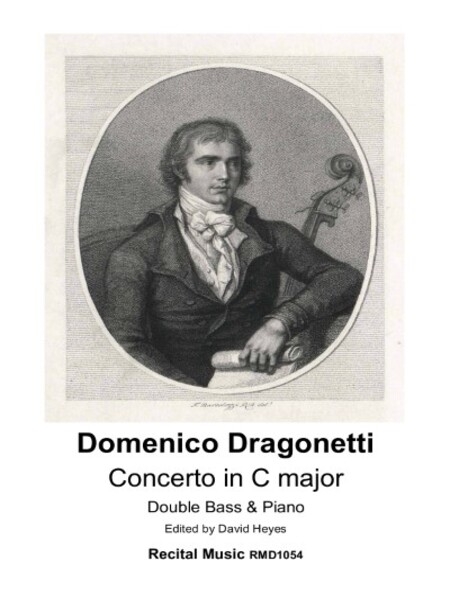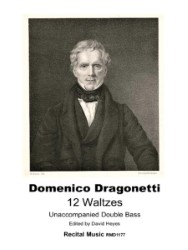Concerto in C major

Page ? of ?
Composer: Dragonetti, Domenico
Editor: David Heyes
Arranged for: Double Bass and Piano
Publisher:
| Product Code: | RMD1054 |
| Publishers Number: | RMD1054 |
| Language: | English |
| Condition: | New |
Dragonetti began playing the guitar and double bass at a young age, and by the age of thirteen, he was appointed principal player at the Opera Buffa in Venice. He later worked at the Chapel of San Marco and at the Grand Opera in Vicenza. His talent was recognized throughout Europe, and he turned down several opportunities, including offers from the Tsar of Russia.
In 1794, Dragonetti moved to London to play in the orchestra of the King’s Theatre and settled there for the remainder of his life. He became a prominent figure in the musical events of the English capital, performing at the concerts of the Philharmonic Society of London and meeting influential persons like the Prince Consort and the Duke of Leinster.
Dragonetti was acquainted with composers Joseph Haydn and Ludwig van Beethoven, whom he visited on several occasions in Vienna. He showed them the possibilities of the double bass as a solo instrument and influenced Beethoven’s music, particularly in the Fifth Symphony where double basses frequently double with the cellos.
He is also remembered for developing the Dragonetti bow. It is characterized by its convex (outwardly curved) shape, a design that Dragonetti pioneered and used to achieve a unique and powerful sound. This bow has a convex shape (the stick of a Dragonetti bow curves away from the hair) which allowed Dragonetti to produce a robust, percussive staccato and a powerful sound overall, making it a popular choice for his style. Dragonetti’s innovative bow and playing technique helped establish the double bass as a solo instrument and influenced subsequent generations of double bassists. Dragonetti bows are known for their excellent attack of staccatos and their suitability for a wide range of musical styles, from the Sturm und Drang period to the Classical era. which he used throughout his life to enhance his performances.
His “Twelve Waltzes for Unaccompanied Double Bass” are particularly famous and well-regarded for their virtuosity. Additionally, he composed a concerto in G major and a quintet in G major, among other works. His influence extended to Beethoven, who was impressed by Dragonetti’s double bass skills and even collaborated with him.
Key works by Domenico Dragonetti:
Twelve Waltzes for Unaccompanied Double Bass: Considered his most famous and virtuosic work.
Concerto for Double Bass and Orchestra in A major: A notable concerto showcasing his skills.
Double Bass Concerto in G major, D290: Another important concerto composition.
Duo in B flat Major for cello and double-bass: A piece showcasing the interplay between two instruments.
Quintet in G Major: A chamber music work.
“The Famous Solo”: A showpiece piece, originally for double bass and orchestra, but also arranged for double bass and quartet.
Domenico Dragonetti passed away on April 16, 1846, in London.
Dragonetti's Concerto in C major is a charming and accessible three-movement work and ideal for the good intermediate bassist.
The first movement is longer than the…
The first movement is longer than the other two movements combined and is similar to Cimador’s Concerto in G major in terms of structure and level of difficulty.
This new edition for double bass and piano is in orchestral tuning and includes two double bass parts – one edited and corrected by David Heyes and a second copy which is a typset version of Dragonetti’s original, wrong notes and all! The music is lively and rhythmic, dramatic and lyrical, and this new edition brings this long forgotten work back to life. There are few technical challenges but much to enjoy, particularly in the orchestral register of the instrument, and this is ideal as both a study work and also for the concert hall.
Few dynamics were included in the original manuscript and editorial ones have been added in brackets [ ]. Wrong notes and missing accidentals have been added, which can be compared between the two solo parts, and a new piano accompaniment, which is both lively and supportive has been created for this first edition.
Dragonetti’s Concerto in C major is originally scored for Solo Double Bass (orchestral tuning), 2 Oboes, 2 Horns and Strings.
Domenico Dragonetti (1763-1846) was the leading double bassist of his generation and lived in London from 1794 until his death. He was one of the highest paid orchestral musicians of his day and appeared at the leading concerts and festivals in London and the provinces for over 50 years, alongside his continuo partner, the cellist Robert Lindley (1776-1855). Dragonetti often performed as a soloist during his first years in London and it likely that much of his music was written at this time.
In his will Dragonetti bequeathed his manuscripts to his good friend Vincent Novello, the composer and founder of Novello’s publishing house, who donated them to the British Library a few years later on his retirement to Italy. The manuscripts have been a fascination to bassists for over 150 years and the 21st-century has seen a resurgence of interest in Dragonetti’s music.
Digital Download – PDF
Shipping costs: No shipping
R.R.P £12.50
Our Price: £10.63
You might also like
-
12 Waltzes for Double Bass
£7.23 -
3 Random Rambles
£7.23 -
6 Christmas Carols
£10.63 -
A Classical Puzzle
£7.23




